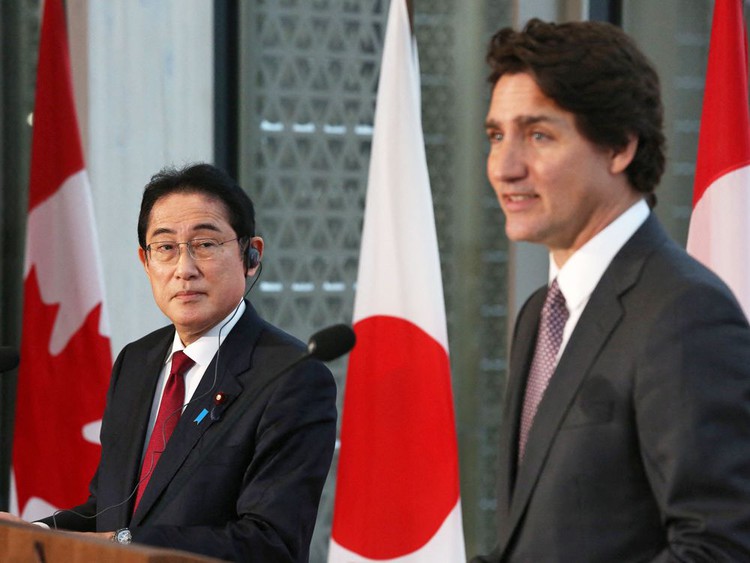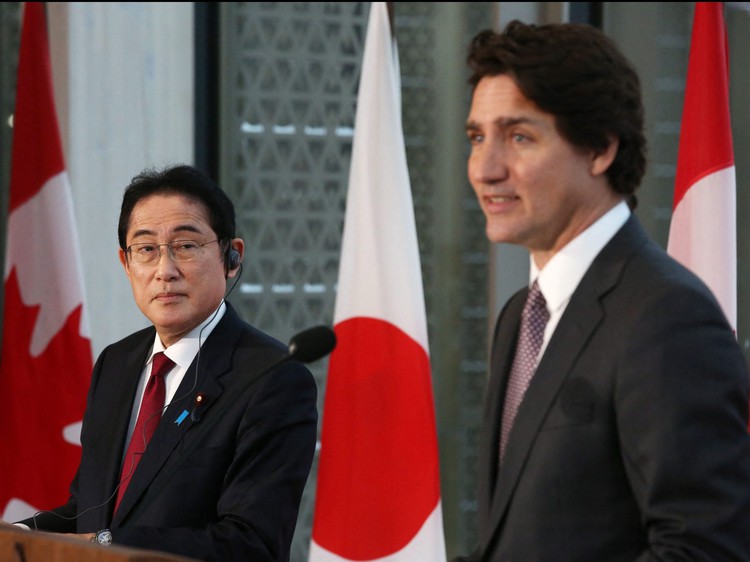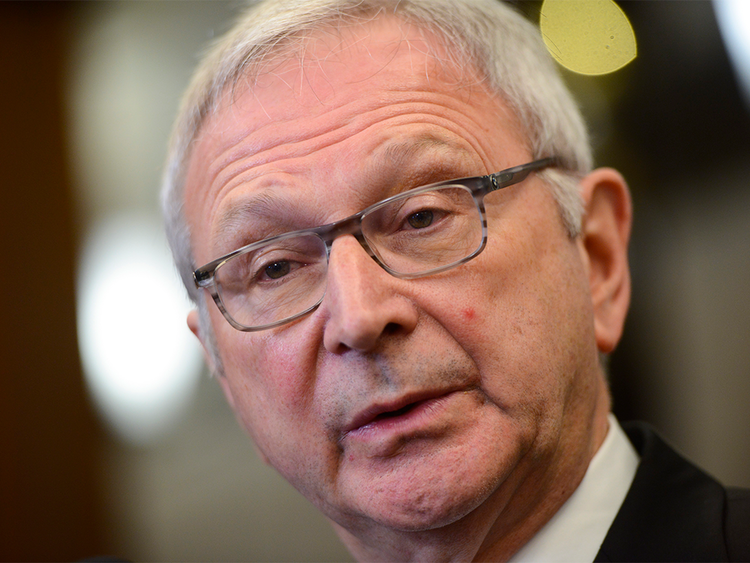But Germany’s bureaucracy is about a quarter or less the size of Canada’s despite their larger population .They are selling to consumers as always but at crazy prices. Its a flipping miracle of miracles that Germany now has 3 LNG offload facilities in place in a matter of 8 months isnt it.
Does that sound reich to you?
Trudeau Makes Good on Ethical Energy to Germany
- Thread starter mentalfloss
- Start date
You are using an out of date browser. It may not display this or other websites correctly.
You should upgrade or use an alternative browser.
You should upgrade or use an alternative browser.
OTTAWA – Japan has “high expectations” for getting natural gas from Canada, but Prime Minister Justin Trudeau made no new commitments to increase exports during meetings with Japanese Prime Minister Fumio Kishida on Thursday.

 apple.news
apple.news
LNG Canada, an export terminal being built in Kitimat, British Columbia, is set to go online in 2025 and export 14 million tonnes to Asia, a proposed second phase would double those export levels. The facility cools natural gas down to -162 C, turning it into a liquid that can be then transported overseas on specialized ships. The first phase was budgeted to cost $40 billion, making it the largest ever private sector project in Canada.
The second phase of the project has not been approved by either regulators or by the consortium of companies, which includes Japanese firm Mitsubishi, as well as Chinese and Korean firms. There are several other proposal for exporting LNG from British Columbia to Asia, but none are currently under construction.
Trudeau said Canada takes seriously its responsibility to supply energy to allies, BUT the world is also looking to decarbonize and Canada has to be prepared for that….
Speaking through a translator, Kishida made it clear that his nation wants Canada’s LNG.
“The world is having an energy crisis,” he said. “We also want to have a closer relationship with Canada in the area of energy.”
Alberta Premier Danielle Smith sent Trudeau a letter in advance of Kishida’s visit calling for the Liberals to speed up regulatory barriers and help ensure more natural gas is shipped from Canada.
What will the NDP/Liberals do?
Being reliable supplier of energy important, Trudeau says as Japan looks to Canada for LNG — National Post
Trudeau said Canada takes seriously its responsibility to supply energy to allies, but the world is also looking to decarbonize
LNG Canada, an export terminal being built in Kitimat, British Columbia, is set to go online in 2025 and export 14 million tonnes to Asia, a proposed second phase would double those export levels. The facility cools natural gas down to -162 C, turning it into a liquid that can be then transported overseas on specialized ships. The first phase was budgeted to cost $40 billion, making it the largest ever private sector project in Canada.
The second phase of the project has not been approved by either regulators or by the consortium of companies, which includes Japanese firm Mitsubishi, as well as Chinese and Korean firms. There are several other proposal for exporting LNG from British Columbia to Asia, but none are currently under construction.
Trudeau said Canada takes seriously its responsibility to supply energy to allies, BUT the world is also looking to decarbonize and Canada has to be prepared for that….
Speaking through a translator, Kishida made it clear that his nation wants Canada’s LNG.
“The world is having an energy crisis,” he said. “We also want to have a closer relationship with Canada in the area of energy.”
Alberta Premier Danielle Smith sent Trudeau a letter in advance of Kishida’s visit calling for the Liberals to speed up regulatory barriers and help ensure more natural gas is shipped from Canada.
What will the NDP/Liberals do?
Once again, an ally has asked Canada to help them replace Russian energy and, once again, Justin Trudeau has effectively said no.
It happened Thursday as Japanese Prime Minister Fumio Kishida visited Ottawa to ask for help securing natural gas and Trudeau gave a public lecture on the need to decarbonize.

 apple.news
apple.news
It happened Thursday as Japanese Prime Minister Fumio Kishida visited Ottawa to ask for help securing natural gas and Trudeau gave a public lecture on the need to decarbonize.
LILLEY: Japan asks for natural gas, Trudeau offers lectures on decarbonizing — Toronto Sun
“The major countries are trying to have a stable supply of energy and also to decarbonize,” Kishida said.
Jack Mintz and Janice MacKinnon: Alberta must assert itself over oil and gas against unilateral emissions cuts — National Post
In Canada, both the federal and provincial governments have significant jurisdiction over climate change policy as it affects natural resources. Both levels of government share jurisdiction over the environment. The federal government has significant capacity to implement policies deemed in the...
What does it say about the state of co-operative federalism in Canada when all 10 provinces are supporting a legal challenge to the federal government’s Bill C-69 on the grounds that, “The federal government has unilaterally declared responsibility for all emissions regulation that overrides provincial jurisdiction” over areas such as resources?
The court battles, along with C-69 and Canada’s cumbersome regulatory processes for approving projects, have been significant hurdles to approving and completing major projects in Canada, which is very problematic for a country that has seen declining business investment and low growth projections relative to comparable countries.
As well as concern about Bill C-69, western provinces are concerned about the lack of federal support for liquified natural gas (LNG) export terminals since currently Canada’s natural gas is only sold internally or to the United States. Given the priorities to supply LNG to Europe and future energy-security needs, it is no surprise that the U.S. has seven operating LNG export terminals and three more under construction.
Canada, on the other hand, has not yet completed even one. Instead, the federal government has pushed green hydrogen, which, in August 2022, it said would be sold to energy-starved Germany, even though it is well recognized that hydrogen will not be a major source of energy for a decade or two to come. Notably, Germany later announced a 15-year contract to purchase LNG from Qatar beginning in 2026.
Canada is missing a golden opportunity not only to sell more natural resources at higher prices but also potentially to reduce global emissions by replacing Chinese coal as a source of energy. Instead, the western provinces are selling their natural gas at a discounted price to the United States, which in turn exports it abroad.
Canada has had nine climate plans since 1990 and has failed to hit any of the targets in them. However, the targets, especially for oil and gas, have discouraged investment and added to the global problem of skyrocketing energy prices. Alberta should make it clear that it will participate in any realistic plans to reduce GHG emissions from the oil and gas industry so long as they do not result in production cuts, which would merely shift oil and gas production from Canada to countries with lower decarbonization standards.
This is the kick in the teeth. the part of the public that strongly cares about climate change keeps voting liberal because 'the conservatives have no plan' - YET THE LIBERALS HAVE BADLY MISSED EVERY TARGET AND PLAN THEY"VE PUT FORWARD. They utterly failed at kyoto despite having absolute power with a split right for many years, they are not hitting paris or coming close, the carbon tax reduction targets don't even get mentioned any more they've failed so badly, etc etc.Canada has had nine climate plans since 1990 and has failed to hit any of the targets in them. However, the targets, especially for oil and gas, have discouraged investment and added to the global problem of skyrocketing energy prices
In fact the greatest reductions came under the conservatives.
As long as we keep voting for fake plans and allowing the liberals to miss targets without consequence and pretending that THEY care about the environment when they clearly don't, then they'll keep making rediculous targets and not caring if they hit them or not.
Oil production is record levels and at a high price. Last time we saw this our dollar was pretty much par with US, today it's down 25% thanks to dilution and inflation.
“Private-sector investment in major projects in Canada is a challenge and we can’t get movement on the reality of natural gas as a transition fuel. We know gas is needed as we move toward a greener climate, but it’s not a headline for a campaign. Natural gas is the transition and will be for years.”
Natural gas exports are in demand as Europe attempts to decouple itself from Russian gas supplies and because gas is the “transition” fuel needed to wean the world off coal. LNG plants can ship gas anywhere in the world. And natural gas emits 50 per cent less carbon dioxide than coal and 30 per cent less than oil.
Canada has enormous reserves of gas but they are effectively stranded because the federal government has imposed barriers to producing, transporting and exporting it, which has greatly increased costs.

 apple.news
The rest at the above link…,
apple.news
The rest at the above link…,
Natural gas exports are in demand as Europe attempts to decouple itself from Russian gas supplies and because gas is the “transition” fuel needed to wean the world off coal. LNG plants can ship gas anywhere in the world. And natural gas emits 50 per cent less carbon dioxide than coal and 30 per cent less than oil.
Canada has enormous reserves of gas but they are effectively stranded because the federal government has imposed barriers to producing, transporting and exporting it, which has greatly increased costs.
Diane Francis: Trudeau's lost LNG opportunity — Financial Post
New Brunswick premier blames PM as Repsol pulls plug on natural gas project
I actually proposed unifying the currencies back then. A whole bunch of Canadians shouted me down, apparently sure that the rise of the Canadollar would continue.Oil production is record levels and at a high price. Last time we saw this our dollar was pretty much par with US, today it's down 25% thanks to dilution and inflation.
Oops.
It's the reason why Canadian banks now operate in the US. They bought everything American they could for CAD pennies on the USD. It's still not in your favour as a domestic US consumer. The price gap on oodles products closed and hasn't reopened. When a can of soup is $1 on either side of the border, US consumers are paying more.I actually proposed unifying the currencies back then. A whole bunch of Canadians shouted me down, apparently sure that the rise of the Canadollar would continue.
Oops.
Most sane Canadians understand the world trades in American dollars .I actually proposed unifying the currencies back then. A whole bunch of Canadians shouted me down, apparently sure that the rise of the Canadollar would continue.
Oops.
Not for long. We'll end up with 2 currencies. One domestic and another North American (possibly including UK) for international trade.Most sane Canadians understand the world trades in American dollars .
I won’t be around to see it .Not for long. We'll end up with 2 currencies. One domestic and another North American (possibly including UK) for international trade.
I have always been surprised by my longevity, starting in grade one learning to hide under the desk in case of nuclear attack . Now looking back I go how could one survive the bodily and physical abuse it’s put through . Now I just take it year at a time , at seventy the future looks shorter .You dont have 2 or 3 years left?
Na, they're working on a digital dollar - they can better control your spending that way. Currencies are going the way of the dodo bird me thinks.Not for long. We'll end up with 2 currencies. One domestic and another North American (possibly including UK) for international trade.
Yes. The digital will be the NA dollar.Na, they're working on a digital dollar - they can better control your spending that way. Currencies are going the way of the dodo bird me thinks.
Just as gold coin gave way to banknotes. The banknote did not spring full-formed from the mind of Gawd and not every technological advance is designed to take away yer rahts.Na, they're working on a digital dollar - they can better control your spending that way. Currencies are going the way of the dodo bird me thinks.
I hope you're right.Just as gold coin gave way to banknotes. The banknote did not spring full-formed from the mind of Gawd and not every technological advance is designed to take away yer rahts.